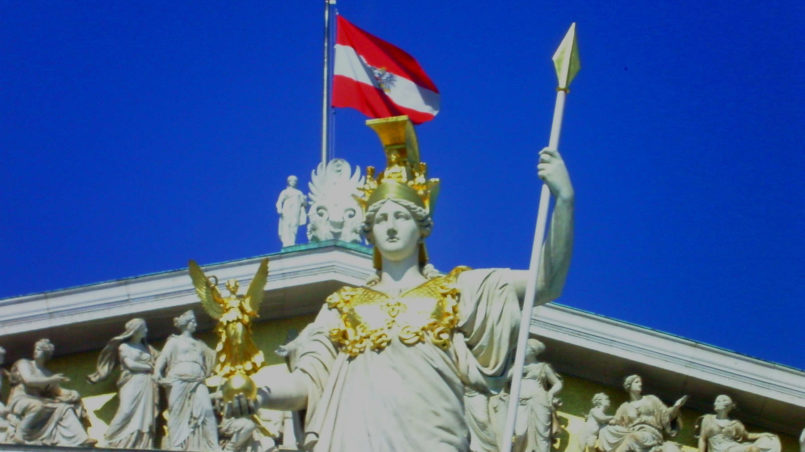Presidential election: the blue surprise egg

The pollsters’ astonishment was great. Not even in the autumn of 2015 in Vienna had they been as far off as in the first round of the presidential election. Yet another head-to-head race, which failed to materialize. Given the ever lowering bond force of the parties, we must attune to polling turning into soothsaying rather than actual guidance. At least the crash of the two governing parties’ candidates was correctly predicted. Nobody is perfect.
The result: a clear election winner (Norbert Hofer), a somewhat disappointing “favorite” (Alexander van der Bellen), an independent candidate with a respectable result (Irmgard Griss) and, trailing far behind, two candidates from formerly major parties separated by 135 votes. The catastrophic performance of red and black had been expected, the overwhelming election victory of Hofer hadn’t. Oh, Lugner participated, as well.
The general shift to the right in Europe (with a few exceptions, for example, Spain) is also evident in this election. The government’s one-eighty in the refugee issue has not brought any improvement in the voting situation for red and black. However, the detailed results show that Hundstorfer did much better in Red-and-Blue Burgenland, than in his home state of Vienna, which was taken by Van der Bellen. Incidentally, the only state not won by Norbert Hofer. The latter reached his best result – just like Hundstorfer – in Burgenland, his home.
The second lowest turnout ever measured at presidential elections, is also somewhat unexpected given the broad field of candidates. Especially for people who are “disenchanted with politics” and do not feel at home with any party, this election was the chance to make their voices heard. Mind you, Irmgard Griss’ result is the best that has ever been achieved by an independent candidate. Nevertheless, I have to ask whether Austria is ready for more direct democracy, given that even with such a wide choice, one-third of voters stayed at home. This can only be explained with the relevance of the office, which is obviously low in the eyes of many Austrians. But in times of crisis – and I think that we are only at the beginning of major changes – this office is irreplaceable (or may be irreplaceable if a responsible President has the Office).
An outlook on May 22: Hofer is now the clear favorite for the runoff for many. Lugner’s votes go to him, along with a part of the few remaining black and red traditional voters. The voices from the Griss-camp go largely to Van der Bellen. For the independent green candidate, the group of non-voters will be crucial: how many can he mobilize with the slogan “prevent Hofer”, and how obscured can he launch this slogan so as not to give rise to a “now more than ever” disposition, which Austrians are known to very much appreciate. Van der Bellen will also have to make his appearance more statesmanlike than before. In this respect Hofer outclasses him. The moments in which he appears as a confused professor to quite a few people, certainly make him human. But for a presidential election they do more harm than good.
Red and black are unsurprisingly facing very difficult times. A tweet by a follower via Puls4 nailed it: Game of Thrones begins – and already two parties are dead. For the Social Democrats in particular, the roof must truly be on fire – after all, human resources for renewal nearing 2018 are quite limited, apart from Hans Peter Doskozil. The ÖVP will probably send their Crown Prince Sebastian Kurz to race for chancellor only after the failed state elections in 2018 . Should he further sharpen his profile by then, he could be a serious competitor for Strache for first place be – a tactical masterpiece a la Schüssel provided. The SPÖ most likely won’t matter. Their shift to the right will continue to cost votes on their left wing which they can not balance out on the right wing. After all, a voter who preferrs the hard line of the FPÖ will always speak to the organ grinder, not the monkey. I assume that neither Mitterlehner nor Faymann will be up for election in 2018. This could be the year in which Michael Häupl retires his political career. Thus, the axis Faymann-Häupl would be history and the Niessl camp could take over. The shift to the right in Austria would be complete.
What political plans does the secret election winner of the evening have for the future? Griss remains guarded. A commitment to the NEOs who supported her campaign, would be the easy way, a movement of her own would be riskier. But given the current mobility of the Austrian electorate, perhaps also a great opportunity – if she finds suitable staff. She’s aware: Another non-starter like Team Stronach is the last thing the political landscape needs.
Translation from German: Serena Nebo
Credits
| Image | Title | Author | License |
|---|---|---|---|
 |
Pallas-Athene | Derschueler | CC BY-SA 3.0 |
